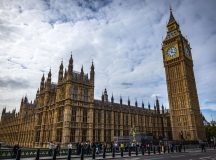Alan Mendoza argues that the new Labour government has set a tone on relations with Israel that can only be described as adversarial. Worse, it has damaged relations with other allies in the process and given succour to some of the worst regimes and terrorist entities in the world by its actions. The editors invite responses to this and other articles about Labour’s policy shifts published in Fathom.
The British General Election of July 2024 was as decisive a result in terms of seats won by the respective parties as has ever been seen on these isles. The ruling Conservatives were unceremoniously booted out of office after 14 years and reduced to a rump of 121 seats. Labour emerged with a landslide figure of 404. It was clear that a seismic change would occur in many areas of policy to reflect the Labour ascendancy.
But not in UK foreign and defence policy. Here the Labour opposition had cleaved fairly closely to the line run by the previous government on areas ranging from defence of Ukraine, to suspicion but not outright hostility about China’s intentions, to the need to spend more money on defence. Yes, there were some differences, notably Labour’s refusal to commit to a timetabled 2.5 per cent level of GDP spending on defence, but these all fitted into the broad parameters of similar bipartisan views on the broad thrust of British policy.
Even when it came to the most vexed foreign policy question of all given the domestic passions it ignited – the 7 October atrocities committed by Hamas, and the Israeli response in Gaza – there was surprising agreement across the aisles. Labour supported Israel’s right to defend itself and retaliate against the Hamas declaration of war. It demanded that the Israeli hostages be returned. It was supportive of UK action to help defend Israel against Iranian missile assault. And it was even circumspect about its requests for a ceasefire in the conflict, phrasing these in ways that could be read as supportive of the general concept, but without the absolutism of Israeli conformity to the outcome that pro-Palestinians demanded.
As late as the Labour election manifesto launch, the party was happy to sign up to the idea of eventual Palestinian statehood – itself a watering down of the Jeremy Corbyn era approach of immediate statehood recognition – but within the construct of a ‘safe and secure Israel’ alongside it. Labour appeared to understand that the realm of Israel policy was a carefully constructed tightrope. And that it was determined to walk along it without bending unduly either way.
What a difference a few weeks makes. In that time, the new Labour government has reversed both its policy in opposition and the previous UK position on the country and conflict, and set a tone on relations with Israel that can only be described as adversarial. Worse, it has arguably damaged relations with other allies in the process and given succour to some of the worst regimes and terrorist entities in the world by its actions.
The blows to Israel policy have landed in quick succession.
First up was Foreign Secretary David Lammy’s announcement on 19 July that the UK would be resuming funding the operations of the United Nations Relief and Works Agency (UNRWA), the UN body providing aid for Palestinians.
UNRWA has long been criticised for perpetuating the conflict between Israel and the Palestinians through its unique granting of refugee status through successive generations, as well as suspicions that some of its staff have been in league with Palestinian terrorist organisations rather than acting as neutral aid brokers. Indeed, the pause in funding by the UK and several other countries after 7 October was directly attributable to allegations that UNRWA staff had actually participated in the Hamas terrorist attacks of that day.
Despite considerable concern that UNRWA had not been able to either refute the charges or show that its staffing was clear of terrorist involvement, the UK highlighted humanitarian needs and the decision of several democratic allies to also restore funding as key reasons for its change of heart.
If allies provided some cover for the UNRWA decision, much more troubling just a week later on 26 July was the UK decision that it would not proceed with attempts, to challenge the International Criminal Court (ICC) over whether it has jurisdiction to issue arrest warrants for the Israeli Prime Minister and Defence Minister.
The ICC’s Chief Prosecutor Karim Khan had announced in May that he had requested such warrants for Benjamin Netanyahu and Yoav Gallant over alleged war crimes in Gaza.
But in June, it was revealed that the UK had filed a request questioning whether the ICC could exercise jurisdiction over Israeli nationals, given that Palestine cannot exercise criminal jurisdiction over Israeli nationals under the Oslo Accords. The UK position at the time was also in lockstep with that of the USA, which as a non-member of the ICC like Israel, was concerned that an ICC jurisdiction grab against a non-member might provide a precedent to one day target its leaders in a similar manner.
Now, suddenly, the Labour government was reversing Britain’s position overnight, ‘in line with our long-standing position that this is a matter for the court to decide on’ in the words of Prime Minister Sir Keir Starmer’s spokesperson.
However, all of this was to pale in comparison with the most consequential move of all; the decision announced by David Lammy on 2 September to suspend 30 out of 350 arms export licences to Israel, affecting equipment for fighter jets, helicopters and drones, on the grounds that they might be being used to breach international humanitarian law.
Labour’s prospective change of policy had been trailed for some time given that the party had made clear that it would seek fresh legal advice on taking power to see whether Israel was complying with the legal terms of UK arms export licences. But what confused many was the seemingly arbitrary nature of the decision.
The Foreign Secretary himself stated that the advice received did not and ‘could not arbitrate on whether or not Israel has breached international humanitarian law’ and consequently, this was ‘not a determination of innocence or guilt’. Instead, the decision was being made on the grounds solely that the review could not conclude the matter either way, and as such, he needed to impose a partial ban as ‘there does exist a clear risk they might be used to commit or facilitate a serious violation on international humanitarian law.’
In short, the Foreign Secretary was admitting that despite there being no evidence Israel was actually breaching international humanitarian law, he was concluding that the unproven possibility of this was sufficient to change established UK policy. He was making a political choice, rather than following a legal requirement, and throwing a key ally under the bus for the government’s own purposes.
This was certainly the conclusion reached by former Conservative Trade Secretary Kemi Badenoch, who pointed out that ‘It is not true that the removal of Israel arms licenses was a legal decision. Keir Starmer should not hide behind this fig leaf. It was very much a political decision’. Badenoch cited that she had seen similar advice when she had reviewed the licences previously, and that it was obvious that the language provided could be finessed either way depending on political preference.
Even other government ministers appeared somewhat perplexed by the thinking behind the decision, with Defence Secretary John Healey admitting ‘It will not have a material impact on Israel’s security’ the day after the announcement.
But if this is indeed the case, then how had the government reached the convoluted position it had put forward as one of such moral clarity?
The answer, surely, lies where this analysis started. At the General Election of July 2024. For amidst Labour triumphs nationwide, some astonishing results were taking place where independent candidates were triumphing over Labour having spent the election campaign targeting voters over the issue of Gaza. In the most extraordinary race of all, in Leicester South, prominent Labour Shadow Cabinet MP Jonathan Ashworth saw a 22,675 majority eviscerated by independent challenger Shockat Adam, who won the seat. Other prominent Labour star figures, like Wes Streeting and Jess Phillips, came incredibly close to following in a similar vein.
Backbench MPs had raised their concerns about frontbench Israel positions for some time. And with the Labour vote in freefall across constituencies with considerable Muslim populations, and dissatisfaction with Israel/Gaza policy being the obvious explanation why at a time when it was Conservative vote share rather than Labour that was plummeting nationally, it is little wonder that Labour in government may well have reasoned that a way of reaching out to an aggrieved parliamentary and voter base might be to change an unpopular stance on that self same issue. And yet, wary of going too far as an international outlier on changed Israel policy, the government simultaneously sought to hold on to some vestiges of its allyship with Israel by making minimal changes to arms licencing, rather than the maximal ones that surely would have been required had the decision really been grounded in law rather than choice.
Unfortunately, this attempt to continue to walk the tightrope of Israel policy without falling off has proved a step too far. Israel condemned the move, pointing out it was not the action of an ally, while the pro-Palestinian lobby pocketed the concession and immediately demanded the full arms embargo that it had always sought. The new government has learned the hard way that trying to please everyone inevitably ends up pleasing no one.
If the arms licencing decision was merely an academic one as the Defence Secretary had suggested, then perhaps no real damage would have occurred. Unfortunately however, it was anything but.
This announcement was particularly jarring as it occurred in the immediate aftermath of the cold-blooded murder of six Israeli hostages by Hamas, on the cusp of their liberation by the Israeli Defence Forces. The first British government decision after this hideous event could therefore easily be viewed as a slap in the face for Israel, the victim of 7 October and its aftermath, and a reward for those who were guilty of the most heinous crimes.
Moreover, in the broader scheme of things, the UK’s decision to unilaterally revoke some of its licences – in contrast to decisions taken by our key democratic allies like the USA, France and Germany – placed the UK in the unwelcome place of being in the vanguard of a controversial policy change on a key international relations issue. With three British decisions on Israel policy now diverging from US positions, the government has certainly created clear red water between the two allies. Whether this has any long-term bearing about the nature of the Special Relationship remains to be seen. Perhaps this will only become apparent once the next incumbent of the White House is selected.
Most importantly, the changed UK approach over Israel calls into question the value of British allyship for a whole host of nations. If the UK is now only to be seen as a fair-weather friend, ready to abandon former friends as soon as political expediency requires, this can only raise concerns about the nature of our alliances. Any ally with an arms trade relationship can now legitimately pose the question of where their prospects might stand with Britain if they find themselves in similar situations to that endured by Israel. This is surely not the message that His Majesty’s Government would wish to broadcast. Yet it is an unfortunate by-product of what has occurred.
It is never a good idea for British foreign policy to be dictated by domestic political concerns, as opposed to the UK’s strategic interests. History has shown that when we make decisions to appease domestic concerns or constituencies as opposed to doing what is right, the repercussions frequently return to haunt us.
It is not too late for the new government to learn from this experience and reverse course on the direction it appears to have set out for Britain-Israel policy. But if it does not, it should beware the unintended consequences that inevitably follow the betrayal of friends in their hour of need.



































